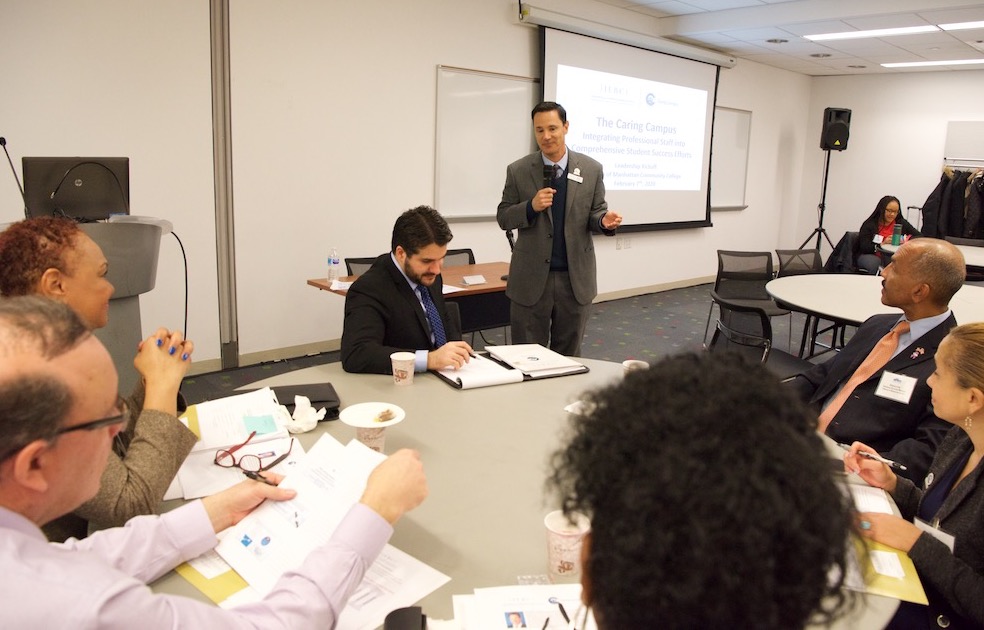
February 11, 2020
On Friday, February 7, a kickoff meeting to mark Borough of Manhattan Community College (BMCC/CUNY)’s participation in the Institute for Evidence-Based Change (IEBC), Caring Campus initiative, took place in the Fiterman Hall Conference Center.
More than 30 BMCC staff from Student Affairs, Administration and Planning, Institutional Effectiveness and Analytics, Public Affairs, Sponsored Programs and other departments gathered to learn about the initiative and ways to support it through their role at the college.
BMCC Interim President Karrin E. Wilks opened the event and said the concept of a Caring Campus relates to the central priorities of BMCC’s Designing for Success strategic planning goals — to increase retention, graduation and transfer rates; to improve learning through culturally responsive pedagogy and support; to expand career development leading to meaningful work with family-sustaining wages, and to achieve equity in these outcomes in a college community in which all members can thrive.
BMCC Dean of Student Affairs Michael Hutmaker also welcomed the meeting participants. “This meeting is geared to staff, because we often are the first to have contact with students when they’re looking for assistance,” he said. “We’re all here to help each other, help the students.”
IEBC President and CEO Brad C. Phillips leads participants in discussion of Caring Campus values
Guest speaker Brad C. Phillips; president, founder and chief executive officer of the IEBC, as well as founder of the California Partnership for Achieving Student Success (Cal-PASS), led the morning’s activities.
“BMCC is already engaging in this work of creating a caring campus,” said Phillips, who presented a PowerPoint and guided participants in targeted discussions at their tables. “My job is to help strengthen that work, to help make what you’re doing, more pervasive. Students come where they feel welcome and stay where they feel cared about. It’s all about the behaviors, the intentionality to show we care.”
Among other topics, the group session focused on specific ways to integrate staff into student success efforts. As a case study in adopting Caring Campus values and strategies, Phillips presented the story of Odessa College, a community college in Odessa, Texas. Odessa College went from single-digit graduation rates and being slated for defunding, to being a college in which Hispanic males, the lowest performing student group, achieved a 94.3 percent course retention rate.
In response to the prompt, “What key student success challenges does your college struggle with?” BMCC staff shared their own experience as students, dealing with issues they believe persist for students today. These include not having had access to services when they attended classes in the evening, and wanting more courses to be offered online.
Another staff person described the challenges students with disabilities encounter when the staff and faculty they encounter don’t understand how to best provide services and facilitate learning, in the context of a student’s ability status.
Small gestures that collectively build inclusivity on campus include what Phillips referred to as the “Ten-Foot Rule,” which he explained to mean, “When a student is within 10 feet and seems to need assistance, take the initiative to approach them. Say ‘Hello,’ smile and use a positive tone.”
An IEBC statement that was part of the meeting materials sums up the rationale behind the initiative: “As we work to improve equity on college campuses, we must go beyond the academic focus to include the human need for connectedness. Students who feel connected to their college are more likely to succeed, persist and complete.”
Each member of the BMCC Caring Campus group was encouraged to share with colleagues, the PowerPoint and concepts that were part of Phillips’ presentation.
The kick-off event will be followed by three half-day coaching sessions for participating staff, in when they identify behaviors and develop implementation, communication and monitoring plans. Between sessions, staff will obtain feedback from colleagues. There will also a concluding webinar to discuss institutionalization of the Caring Campus actions, and to celebrate its ongoing success at BMCC.
STORY HIGHLIGHTS
- On February 7, a kickoff meeting marked BMCC’s engagement with the Institute for Evidence-Based Change (IEBC), Caring Campus initiative
- More than 30 staff from across BMCC gathered to learn about the initiative and ways to support it through their role at the college
- A central tenet of the Caring Campus, which strives to improve student retention and success, is that “students come where they feel welcome and stay where they feel cared about.”

